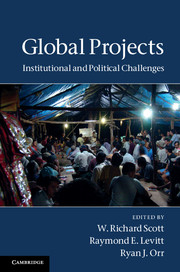Book contents
- Frontmatter
- Contents
- List of figures
- List of tables
- List of contributors
- Preface
- Introduction: studying global projects
- Part I Foundational themes
- Part II Institutional differences and global projects: empirical studies
- 4 Rules versus results: sources and resolution of institutional conflicts on Indian metro railway projects
- 5 Institutional exceptions on global projects: a process model
- 6 Local embeddedness of firms and strategies for dealing with uncertainty in global projects
- 7 Who needs to know what? Institutional knowledge and global projects
- Part III Political conflicts and global projects
- Part IV Governance strategies and structures
- References
- Index
6 - Local embeddedness of firms and strategies for dealing with uncertainty in global projects
Published online by Cambridge University Press: 05 June 2012
- Frontmatter
- Contents
- List of figures
- List of tables
- List of contributors
- Preface
- Introduction: studying global projects
- Part I Foundational themes
- Part II Institutional differences and global projects: empirical studies
- 4 Rules versus results: sources and resolution of institutional conflicts on Indian metro railway projects
- 5 Institutional exceptions on global projects: a process model
- 6 Local embeddedness of firms and strategies for dealing with uncertainty in global projects
- 7 Who needs to know what? Institutional knowledge and global projects
- Part III Political conflicts and global projects
- Part IV Governance strategies and structures
- References
- Index
Summary
What is called foreknowledge cannot be elicited from spirits, nor from Gods, not by analogy with past events, nor from calculations. It must be obtained from men who know the situation.
– Sun Tzu (500 BCE)Introduction
A CEO went to Okinawa for the first time. He was on vacation – to see the beaches, to experience the local culture, and to play golf. After the trip, a researcher asked him a question: “How much did the success of your trip depend on your knowledge of the local Japanese context: the language, history, culture, economics and politics?” His answer was: “Gee. Not very much. I had to count local currency, book a hotel room and I even learned a few words of Japanese and it was a good holiday.”
A second CEO also went to Okinawa, also for the first time, but with a different objective. He went to buy land, obtain permits, and develop a beachfront hotel and resort. Two years into the project, he was asked the same question and he offered a far more elaborate reply:
It was impossible to know all the risks going in. And even the risks that we thought we knew, it didn't mean we knew what to do about them. Our success owes more to our [adaptability] than it does to our ability to predict the risks. And we adapted by making friends with locals and by tapping local knowledge for each key decision … [Local knowledge includes] all manner of facts and trends about the local theatre – about real estate activity, capital markets, city bylaws, building codes, contract protocol, the gray area between the written law and what is enforced. […]
- Type
- Chapter
- Information
- Global ProjectsInstitutional and Political Challenges, pp. 183 - 246Publisher: Cambridge University PressPrint publication year: 2011
- 5
- Cited by

